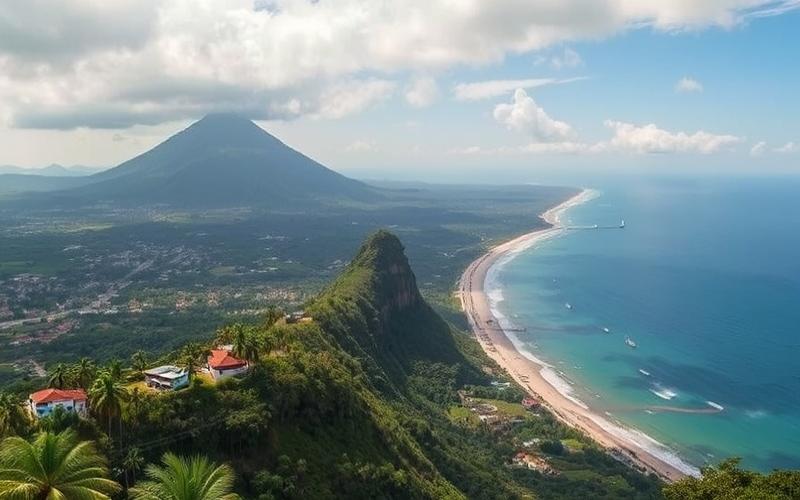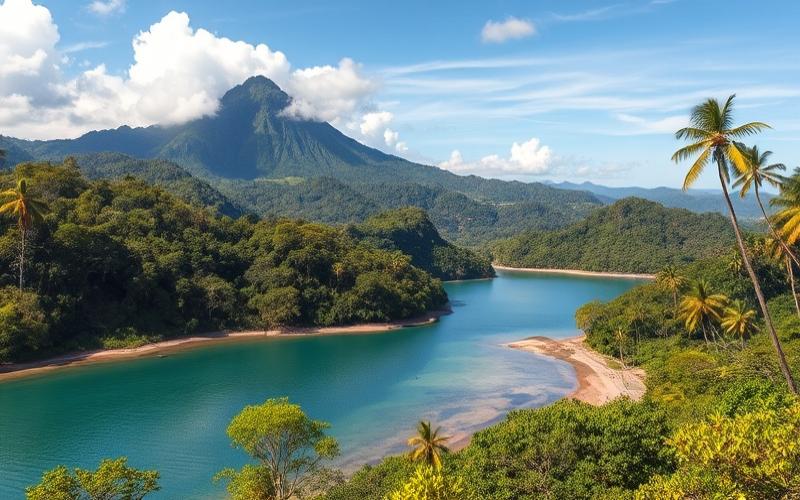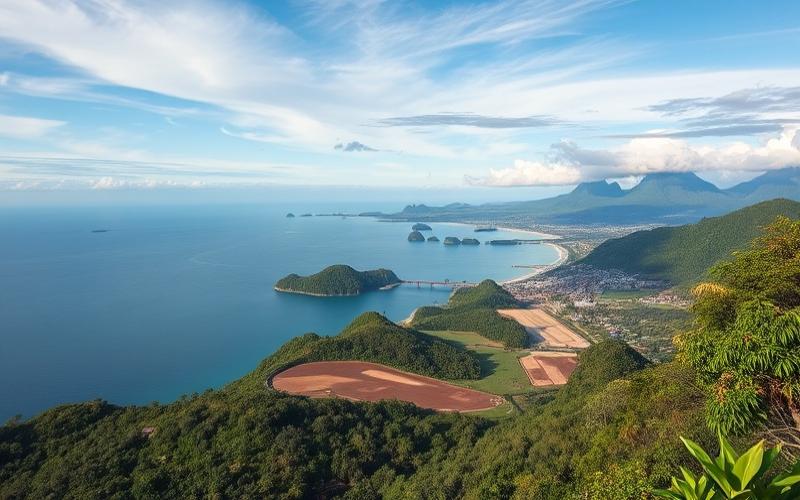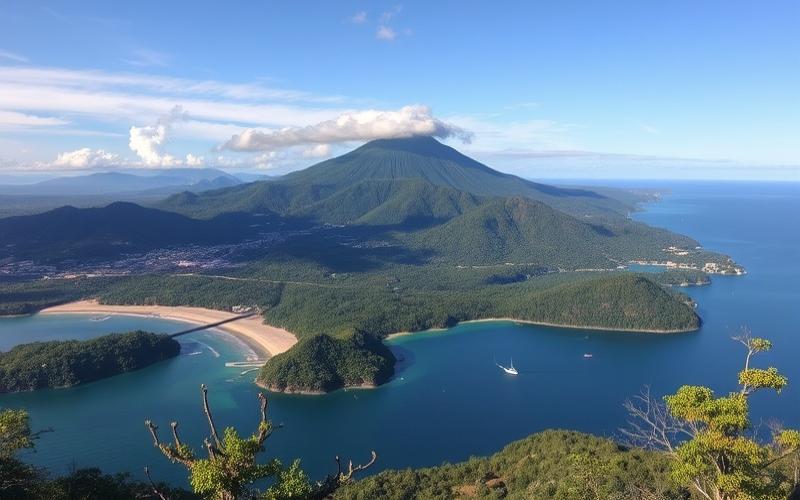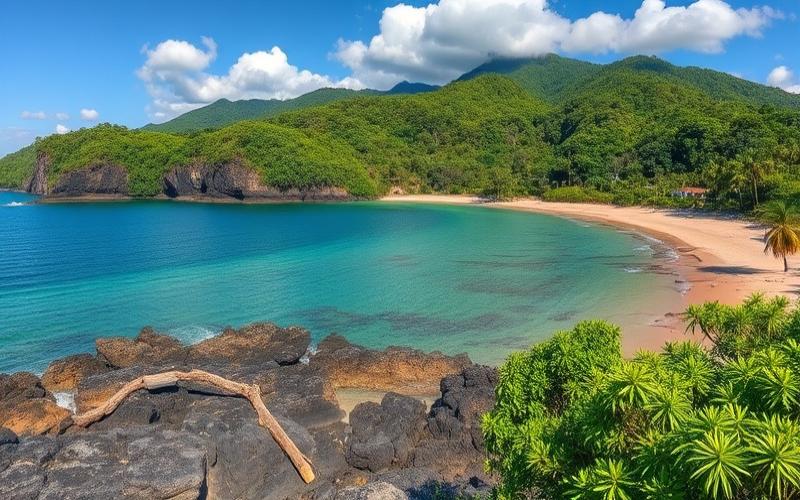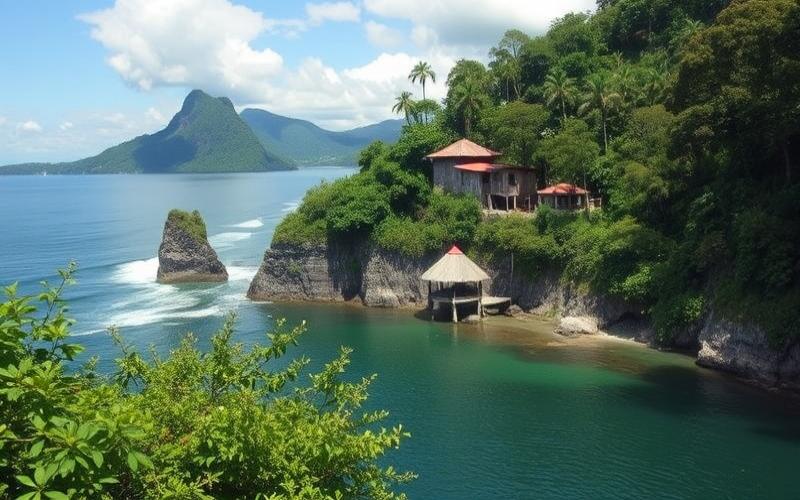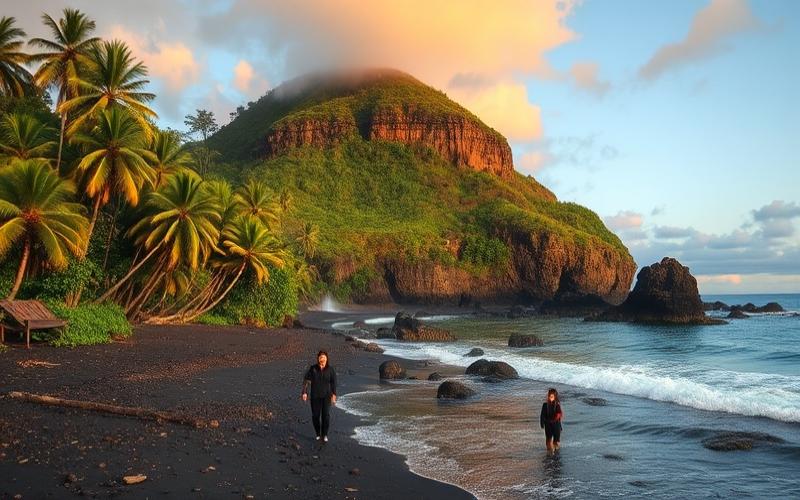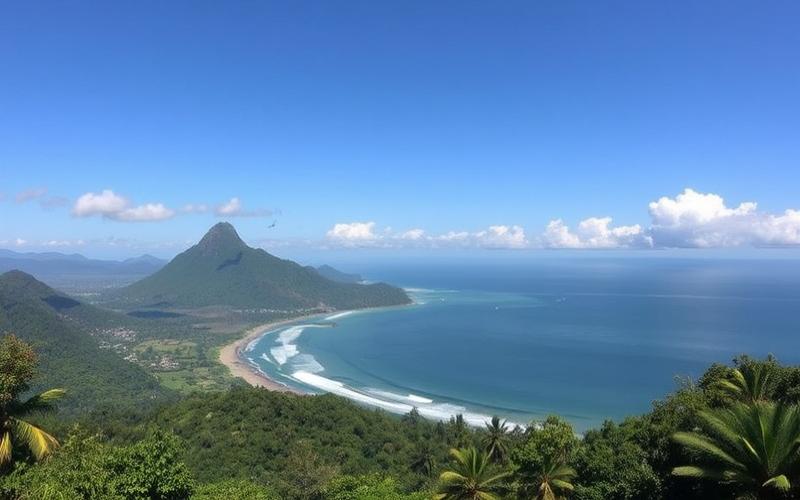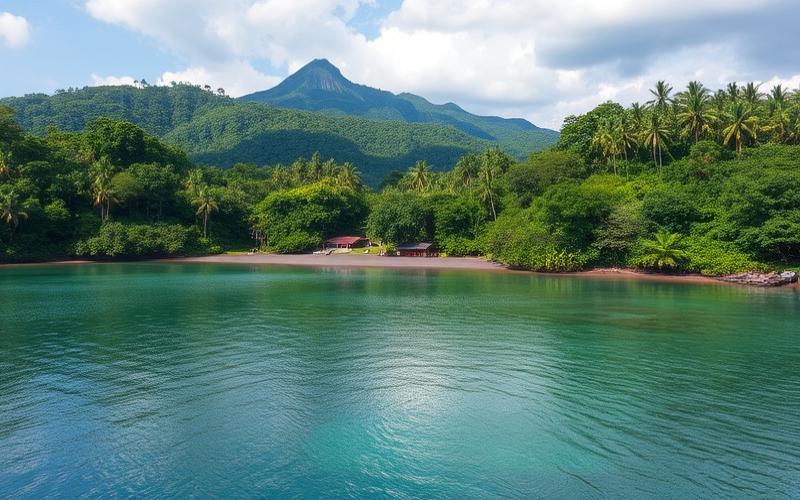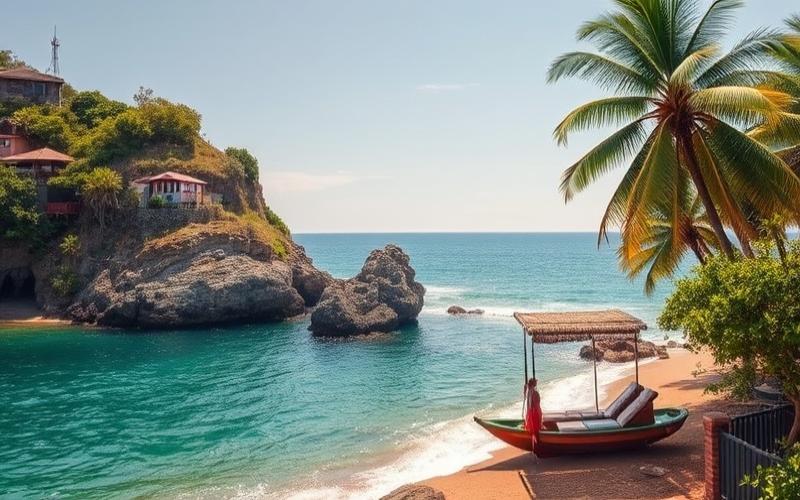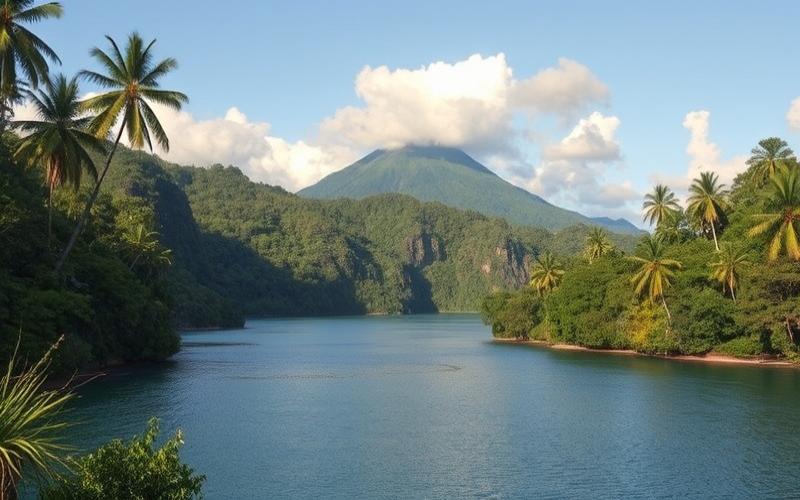
 Published on and written by Cyril Jarnias
Published on and written by Cyril Jarnias
Getting Started with Long-Term Real Estate Rental in Costa Rica
Getting started with long-term real estate rental in Costa Rica opens the door to a world of rewarding opportunities for both investors and future tenants. With its breathtaking landscapes and welcoming communities, this Central American country is increasingly attracting those dreaming of a living environment where nature and modernity coexist harmoniously.
However, navigating the Costa Rican rental market can seem complex without a thorough understanding of its legal and cultural particularities. This article will reveal the essential steps, indispensable tips, and key resources to turn this dream into reality, while ensuring your investment is secure and profitable.
Good to Know:
Costa Rica is renowned for its political stability and commitment to environmental protection, making it an attractive destination for real estate investors.
Long-Term Real Estate Rental in Costa Rica: A Profitable Investment
Long-term real estate rental in Costa Rica offers attractive financial benefits, particularly due to the appreciation potential in developing regions like Guanacaste, where international demand is strong. Prices remain affordable for a high standard of comfort, allowing for a gross annual return typically between 7% and 11% in residential properties and up to 17% in hospitality.
Key Points on Financial Benefits and the Rental Market:
- Potential Real Estate Appreciation:
- Developing regions experience continuous increases in property values.
- In some sought-after beach areas, resale often generates significant capital gains.
- High Rental Yield:
- Typical annual returns: 7–8% for long-term rentals; up to 9–10% with mixed short/long-term rental strategies.
- Growing Demand:
- Costa Rica attracts more European and North American expatriates and retirees each year seeking political stability, security, and quality of life.
| Investment Type | Observed Gross Annual Return |
|---|---|
| Long-Term Residential Rental | 7 – 11 % |
| Mixed Short/Long-Term Rental | Up to 10 % |
| Hospitality Investment | Up to 17 % |
Recent Economic Statistics Supporting These Trends:
- GDP growth around 4 to 5% per year in recent years
- Consistently rising tourism with several million annual visitors
- Real estate market stimulated by the growing influx of foreign buyers
Tax Incentives & Administrative Ease:
- Capital gains exemption (up to three sales per year)
- Moderate local taxes
- Equal rights to nationals for property purchase or management (ability to own property in one’s name even without permanent residency)
- Simplified administrative procedures: clear notarial deeds, low bureaucracy compared to many other Latin American countries
Major Legal Advantages for Foreign Investors:
- Absolute right to foreign ownership (excluding protected maritime zones)
Cultural and Lifestyle Aspects Enhancing the Country’s Appeal:
- World-renowned quality of life (high gross national happiness index)
- Exceptional biodiversity: tropical forests, pristine beaches, diverse wildlife
- Stable tropical climate year-round promoting outdoor recreation
- High-performing healthcare system recognized in Latin America
Expatriates Also Appreciate:
- Easy access to modern services while living in a preserved natural environment
- Cultural integration facilitated by a welcoming population
In Summary:
Renting real estate in Costa Rica constitutes not only a profitable wealth strategy but also privileged access to a healthy lifestyle in the tropics. Attractive tax incentives add to the positive economic prospects linked to the country’s tourism and demographic dynamism.
Good to Know:
Long-term real estate rental in Costa Rica offers attractive financial benefits, particularly due to the property appreciation potential in rapidly developing areas, such as the Guanacaste region. The rental market is especially favorable for foreign investors, stimulated by growing demand for housing from expatriates and retirees, which translates into an interesting rental yield. In 2022, Costa Rica recorded 2.5% economic growth and an 8% increase in tourism, strengthening the country’s financial stability. Investors also benefit from tax incentives and simplified administrative procedures, facilitating property acquisition and management. The country is appealing due to its exceptional quality of life, rich biodiversity, and tropical climate, making Costa Rica an ideal choice for long-term real estate investment.
Drafting an Effective and Secure Lease
A clear and comprehensive lease is fundamental to protecting the interests of both the owner and the tenant during the long-term rental of real estate in Costa Rica. A well-drafted contract limits the risk of misunderstandings, legally frames the relationship, and allows for anticipating potential conflicts.
Essential Clauses to Include in a Costa Rican Lease:
- Lease Duration
- The law imposes a minimum duration of three years for residential or commercial leases.
- Automatic renewal may apply if neither party notifies their contrary intention three months before expiration.
- Indefinite-term contracts are not permitted.
- Rent Amount and Payment Conditions
- Specify the amount, currency (usually colones or dollars), as well as the method and frequency of payments (monthly, bank transfer, etc.).
- Detail any possible increases (indexation according to inflation or legal caps).
- Security Deposit
- Generally equivalent to one month’s rent.
- Specify the conditions under which this deposit is refunded or not (e.g., early departure).
- Tenant Obligations
- Timely rent payment
- Proper use of the property according to its intended purpose
- Routine maintenance
- Compliance with internal regulations
- Owner Obligations
- Ensure peaceful enjoyment of the premises
- Perform necessary major repairs
- Early Termination
- Conditions allowing the tenant or owner to prematurely terminate the contract
- Legal minimum notice period generally set at three months
| Clause | Legal Requirement/Common Practice | Key Points |
|---|---|---|
| Duration | Legal minimum: 3 years | Automatic renewal unless notice given |
| Amount & Payment | Free but specified in contract | Details on indexation and method |
| Deposit | Generally = one month’s rent | Refund subject to defined conditions |
| Termination | Legal min. notice: three months | Specific clauses encouraged |
Specific Clauses Related to Costa Rican Laws:
- Explicitly state that the contract complies with Law No. 7527 governing urban/residential leases.
- Mention all limitations regarding annual increases (cap indexed to inflation).
- Consider the particular protection granted to tenants; for example, it is difficult for an owner to evict without serious cause validated by court decision.
- Add any clause related to applicable taxation on rental income: declarative obligation to local tax authorities.
Additional Practical Tips:
- Always consult a local specialized lawyer before signing to ensure compliance with current Costa Rican law and avoid any abusive or null clauses.
- Formally register the lease with the competent authorities to strengthen its enforceability; this particularly protects against any unforeseen change of ownership during the contractual period.
Tips for Good Communication Between Parties:
- Establish a clear procedure from the start for reporting breakdowns, urgent repairs, or administrative questions (dedicated email, WhatsApp group…)
- Schedule periodic – for example, semi-annual – friendly meetings/reviews on topics such as: general condition of the property, mutual satisfaction regarding respective obligations.
- Keep all important written communications related to the lease so they can serve in case of dispute.
A detailed lease drafted with local legal rigor is your best insurance against any future disagreement.
Good to Know:
To draft an effective and secure lease in Costa Rica, it is essential to have a clear and comprehensive document that protects the interests of all parties. Ensure you include essential clauses such as the lease duration, rent amount, payment terms, as well as the obligations of the tenant and the owner. Also provide specific provisions for lease termination. It is crucial to comply with local laws that favor tenant protection and govern taxation. Consult a local lawyer to verify the lease’s legal compliance. Registering the lease with the competent authorities strengthens its validity and offers increased protection. To prevent conflicts, encourage fluid and proactive communication between the tenant and the landlord, for example, by instituting regular reports to discuss potential issues and maintain good relations.
Defining a Competitive and Attractive Rent
A competitive and attractive rent in Costa Rica results from a fine analysis of the local real estate market, integrating geographic location, rental demand, surrounding amenities, and the specific expectations of tenants.
Determining Criteria for a Competitive Rent
Geographic Location
- Coastal areas (Jaco, Manuel Antonio) are highly sought after for seasonal rentals due to their proximity to beaches and national parks.
- Urban centers like San José or Escazú attract more expatriates and professionals seeking long-term rentals with access to urban services.
- Emerging markets (Uvita, Ojochal) are gaining popularity among those seeking tranquility and authenticity while benefiting from developing infrastructure.
Rental Demand
- Strong demand in tourist areas during high season (North American/European holidays).
- Continuous growth in the number of expatriates and digital nomads in the Central Valley.
- Increased stability for long-term rentals in urban areas; more pronounced volatility on the coast due to tourist seasonality.
Surrounding Amenities & Public Services
- Proximity to international schools, private hospitals, shopping centers, or major roadways strongly enhances the value of an urban rental (e.g., modern two-bedroom apartment in Escazú: $1,200/month).
- Ocean views or direct beach access remain decisive in the premium coastal segment (e.g., three-bedroom ocean-view house in Uvita: $2,000/month).
Tenant Expectations
| Tenant Type | Main Expectations |
|---|---|
| International Tenants | Reliable high-speed internet Proximity to shops/services Security |
| Local Tenants | Affordable price Easy access to public transport Family-friendly spaces |
| Digital Nomads/Expats | Functional furnished spaces Flexible lease Proximity to social venues |
Impact of Real Estate Prices on Rents
- The national average gross yield stands around 7.8%, with peaks higher in some urban provinces like San José (up to 9.2% for a family apartment); this yield closely depends on the ratio between the property’s purchase price and the possible rent level.
- In premium sectors where the price per square meter is high (Escazú/Santa Ana), the yield remains stable around 7.1%, as sustained demand justifies high rents but also a significant initial valuation.
Owner Strategies to Set an Attractive Rent Without Sacrificing Profitability
- Regularly conduct local competitive monitoring to adjust prices according to:
- Observed average occupancy
- Seasonal evolution
- New amenities offered by the neighborhood
- Prioritize:
- Stable long-term leases in main cities benefiting from a regular clientele
- Value addition through extra services: designer furniture, included weekly cleaning service
- Adapt the offering according to the targeted type:
- Furnished short-term rental on the coast (+13% VAT since January 2025)
- Unfurnished rental exempt in downtown areas
Current Examples
| Location | Property Type | Average Monthly Rent | Target Audience |
|---|---|---|---|
| Jaco/Manuel Antonio | Seaside Villa | $4,000 – $6,000 | Tourists/International Families |
| Escazú | Modern T2 Apartment | $1,200 | Expats/Professionals |
| Uvita/Ojochal | Family Ocean-View House | $2,000 | Retirees/Digital Nomads |
To remain competitive as a landlord in Costa Rica: it is essential to combine dynamic pricing positioning based on real local data; permanent adaptation to evolving needs – particularly those from the growing flow of expatriates – while scrupulously ensuring the offering of modern comfort and security.
Good to Know:
To define a competitive and attractive rent in Costa Rica, it is crucial to analyze the local real estate market by considering factors such as location, rental demand, and surrounding amenities. Popular areas like San José and Guanacaste can justify higher rents due to strong rental demand and the presence of modern amenities and developed public services. It is wise to compare rents in similar properties to align prices while remaining attractive to potential tenants, whether international or local. Tenant expectations vary, but good value for money is often essential, especially with the growing influence of real estate sale prices on the rental market. Owners can also offer incentives such as extended lease periods at reduced prices or packages including certain utilities to increase attractiveness without harming profitability. Using online platforms to track current trends and adjust rents accordingly is an effective strategy to stay competitive.
Optimizing Tenant Relationship Management
To optimize tenant relationship management, it is essential to rely on proven practices, integrate suitable digital tools, and consider the cultural specificities of Costa Rica.
Best Practices for Clear and Open Communication:
- Prioritize written exchanges (emails, professional messaging) to keep a record of important discussions.
- Organize an initial interview or meeting to present the property, explain the rules, and answer the tenant’s questions.
- Provide a detailed welcome guide (procedures, emergency contacts, equipment operation, house rules).
- Encourage regular dialogue and offer a single communication channel for all requests.
Setting Precise Expectations and Rules from the Start of the Contract:
- Draft a detailed lease agreement, compliant with Costa Rican legislation (minimum three-year duration for a standard lease, rent review terms, security deposit, notice period, subletting prohibition).
- Include a clear list of respective responsibilities regarding maintenance, repairs, and use of common areas.
- Present internal regulations adapted to the local context (respect for neighbors, waste management, noise hours).
Tips for Managing Conflicts Constructively:
- Adopt an active listening posture when faced with complaints or disagreements.
- Propose rapid mediation, ideally in person, to defuse tensions.
- Document each step of the conflict (exchanges, proposed solutions) to ensure transparent management.
- Resort to a third party (real estate agency, local mediator) in case of persistent deadlock.
Digital Tools to Facilitate Communication and Request Management:
| Tool | Main Function | Advantage |
|---|---|---|
| Management Platforms | Centralization of tenant requests | Ticket tracking and history |
| Instant Messaging | Quick and informal communication | Responsiveness, accessibility |
| Electronic Signature | Quick document validation | Time saving, legal security |
| Mobile Application | Incident reporting, intervention tracking | Ease of use, traceability |
Importance of Responsiveness and Availability:
- Respond quickly to inquiries, especially in case of emergencies (leak, breakdown).
- Set up an on-call system or delegate management to a local manager to guarantee on-site presence, especially for non-resident owners.
- Inform the tenant of your availability and average processing times.
Specific Recommendations for Costa Rica:
- Understand and respect local customs, notably cordiality in exchanges, respect for privacy, and valuing dialogue.
- Consider cultural specificities, such as the importance given to family, tolerance regarding certain practices (pets, parties), and collective management of common areas.
- Stay informed about local housing regulations (minimum lease duration, rent review procedures, departure notice).
Transparency on Repairs and Maintenance:
- Inform the tenant as soon as an intervention is planned or when a problem is reported.
- Share the schedule for preventive and corrective maintenance.
- Specify the financial responsibility modalities (borne by the owner or tenant depending on the nature of the problem).
Implementing a Feedback System:
- Offer regular satisfaction surveys (after a repair, at year-end).
- Install a digital or physical suggestion box to collect anonymous feedback.
- Organize periodic follow-up meetings to discuss possible improvements.
Key Takeaway:
Professional rental management relies on clarity, responsiveness, and listening, while considering the cultural specificities of Costa Rica. Integrating digital tools, transparency on maintenance, and valuing feedback allow for sustainably improving the relationship with tenants and the property’s profitability.
Good to Know:
To optimize tenant relationship management in Costa Rica, it is crucial to maintain clear and open communication, using digital tools like WhatsApp or dedicated platforms to quickly respond to your tenants’ requests. From the start of the lease agreement, establish precise expectations and clear rules to avoid misunderstandings. Proactive conflict management is essential; address them constructively by listening to tenant concerns and proposing fair solutions. Understanding local customs, such as the preference for face-to-face interactions, can also strengthen the relationship. Be transparent about repairs and maintenance, and encourage constant feedback via a feedback system to address tenant needs and improve the rental experience. As an owner, your responsiveness and availability are decisive in establishing a climate of trust and retaining your tenants long-term.
Disclaimer: The information provided on this website is for informational purposes only and does not constitute financial, legal, or professional advice. We encourage you to consult qualified experts before making any investment, real estate, or expatriation decisions. Although we strive to maintain up-to-date and accurate information, we do not guarantee the completeness, accuracy, or timeliness of the proposed content. As investment and expatriation involve risks, we disclaim any liability for potential losses or damages arising from the use of this site. Your use of this site confirms your acceptance of these terms and your understanding of the associated risks.






